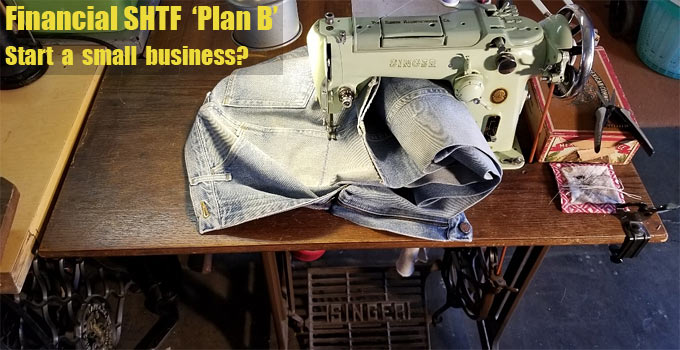Personal Financial SHTF Plan B
Guest article by ‘CD in Oklahoma’
In the event of a Financial SHTF as an individual, do you have a “Plan B” if your normal stream of income is suddenly interrupted?
Loss of personal income can be very much of a disaster for nearly anyone whether you’re working for others, retired, or are a small business owner.
(My definition of a Financial SHTF is any event that affects my financial well-being, regardless of whether it affects anyone else or not.)
What If
Let’s say that today you’re still in the workforce and your job ends. Are you planning on transferring to another company doing basically the same work, or what?
If you’re retired and depend on a pension, Social Security, and/or Wall Street and that money ends or decreases, have you got a way in mind to replace that lost income?
If you’re a Micro Business owner, and your clients/customers suddenly are not able or willing to purchase your existing goods or services, do you have other goods or services in mind that they (or others) might purchase?
Formulating a Plan B
Thinking about what you would do if money got tight is a beneficial exercise.
You should always be thinking about a back-up plan.
The world doesn’t have to end for things to get really bleak on the home front financially. It could be just you and your income that is affected.
So, no matter which of the three groups above you fall under; let’s think about your Plan B.
Plan B – Doing What?
Providing goods or services is one answer. Relocating could be a solution.
We’ve all probably heard the term “reinventing yourself”, and in a SHTF situation, that may be exactly what you’ll have to do.
Relying on what you know may be a decent strategy, but there are some details that one needs to keep in mind to avoid pitfalls. There may be a significant learning curve to make the change.
– If you’ve been in retail before, what if anything has changed?
– What goods will you sell? To whom? Selling from stash or regular restocking?
– If entering retail for the first time, how do you get started?
– Is the new retail business in a shop, at home, or where? What are the differences?
– Can you combine retail sales with a compatible service?
– If you’re going to provide a service, have you done it before?
– Are you still physically able to provide a past service you’ve done?
– If it’s a new service, how do you get started? Where? For whom?
– If your service is currently a hobby, how do you transition it into profit producing?
– If you have to relocate, where will you go? How? Why there?
Selecting a Plan B
So, you’ve thought it over and come up with a Plan B just for you. Now the time has come to begin fine-tuning this new venture adventure.
You’ve decided where you might be able to relocate to so that you can work for someone else, or you’ve selected the best goods or services that you might be able to provide for income.
The next step is to do some serious thinking and research about your selection now while there’s time and you don’t have to rely on it to live. What are the chances of your relocation being successful?
In the case of goods and services, are you going to be able to do any groundwork now to further your venture, like acquiring tools, equipment, or facilities that will be needed?
Can you begin selling your goods or conducting your service on a part-time basis now?
I believe that a new personal venture has more chance of being successful if you can begin the process before you’re in dire need of it for livelihood.
Unfortunately, not everyone will have the time or energy to do what they’re doing now plus add on a side gig, but if you can’t physically do it, at least you can still be thinking about it and researching it.
Success Stories
Just the thought of personal financial SHTF causes great concern for most folks, and can seem so potentially devastating as to think it may be impossible to make it through it. But if you look around there are many success stories for encouragement.
People start up full-time small retail businesses, boutiques, and shops regularly.
People with simply a new idea have started successful service ventures.
All sorts of hobbies have been turned into small service businesses, including sewing, car mechanics, home repairs, pet grooming, house cleaning, delivery services, computer repair, etc.
The list goes on and on, and don’t forget about firing up a top-three online survival weblog!
Think about your Financial Plan B. I’m sure that there are other success stories and potential Plan B ideas out there that could be valuable to readers, so please share them in the comments.
– CD in Oklahoma

